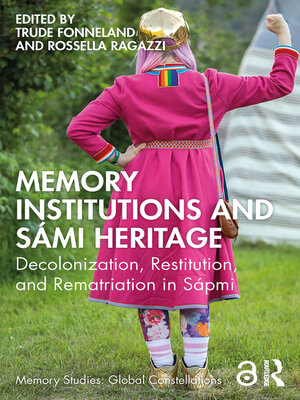Memory Institutions and Sámi Heritage
ebook ∣ Decolonization, Restitution, and Rematriation in Sápmi · Memory Studies: Global Constellations
By Trude Fonneland

Sign up to save your library
With an OverDrive account, you can save your favorite libraries for at-a-glance information about availability. Find out more about OverDrive accounts.
Find this title in Libby, the library reading app by OverDrive.



Search for a digital library with this title
Title found at these libraries:
| Library Name | Distance |
|---|---|
| Loading... |
With a focus on Sápmi – the transcultural and transnational homeland of the Sámi people – this book presents case studies and theoretical frameworks which explore the ways in which memory institutions such as museums, archives, and festivals participate in and guide processes of appropriation, decolonization, and memory-making.
The destruction and concealment of Sámi objects in both private and museum collections worldwide have impacted Sámi knowledge systems, disrupting local ways of knowing. Appreciation and reappropriation are important acts of decolonization which seek to create openings for reconnection to traditions, languages, and practices that were forcibly suppressed in the past. Western memory institutions such as museums, archives, and galleries have had a great impact on how heritage has been collected, stored, conserved, and organized within closed walls and glass cases. As the new museology movement developed in the 1990s, numerous examples revealed how difficult it became for researchers and public alike to access heritage. Considering the proliferation of cultural interventions and the growth of Sámi mobilization, which calls into question assumptions about how best to activate and experience Sámi cultural heritage and what constitutes appropriate stewardship, this book sheds light on initiatives to return artefacts to the Sámi community. With particular attention to the ways in which Sámi self-determination and the shifting boundaries between Indigenous and settler identities are articulated, challenged, and renegotiated, it draws on approaches from critical museology and Indigenous methodologies to explore the initiation, experience, and operationalizing of restitution projects.
This book will therefore appeal to scholars of cultural studies, anthropology, sociology, and museum and heritage studies, as well as to those interested in questions of repatriation, restitution, and healing processes.







